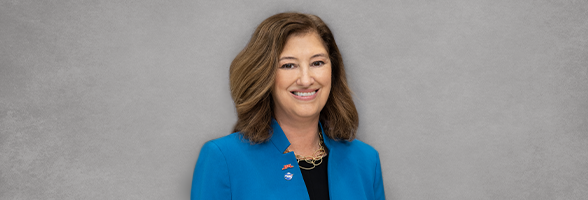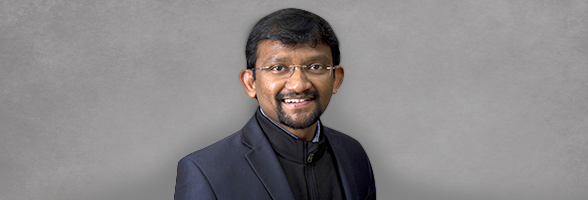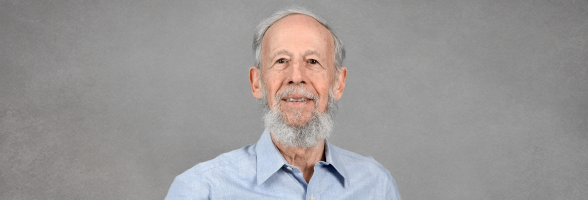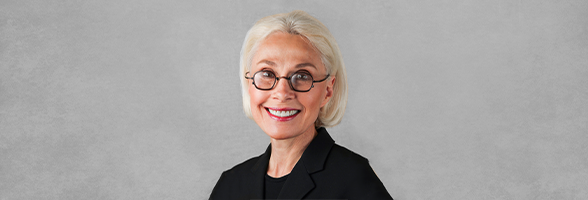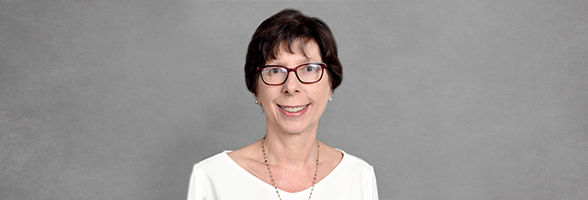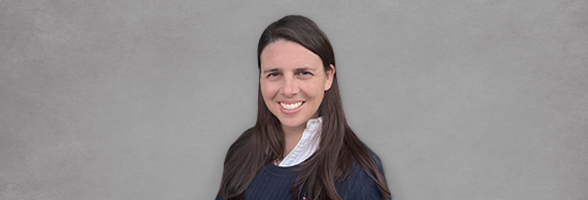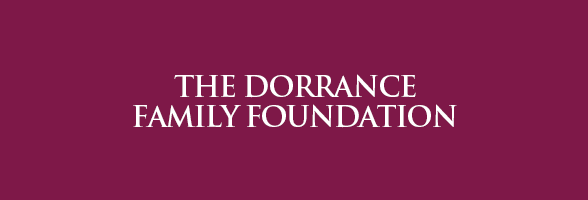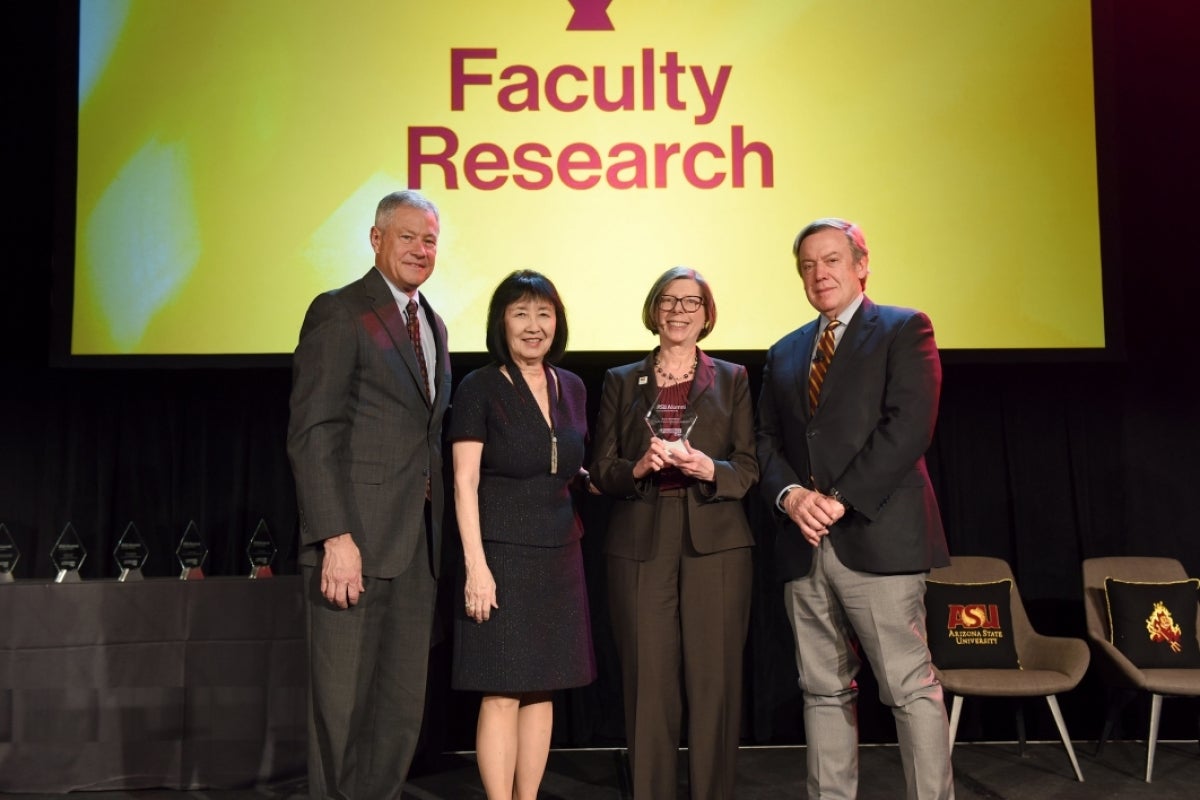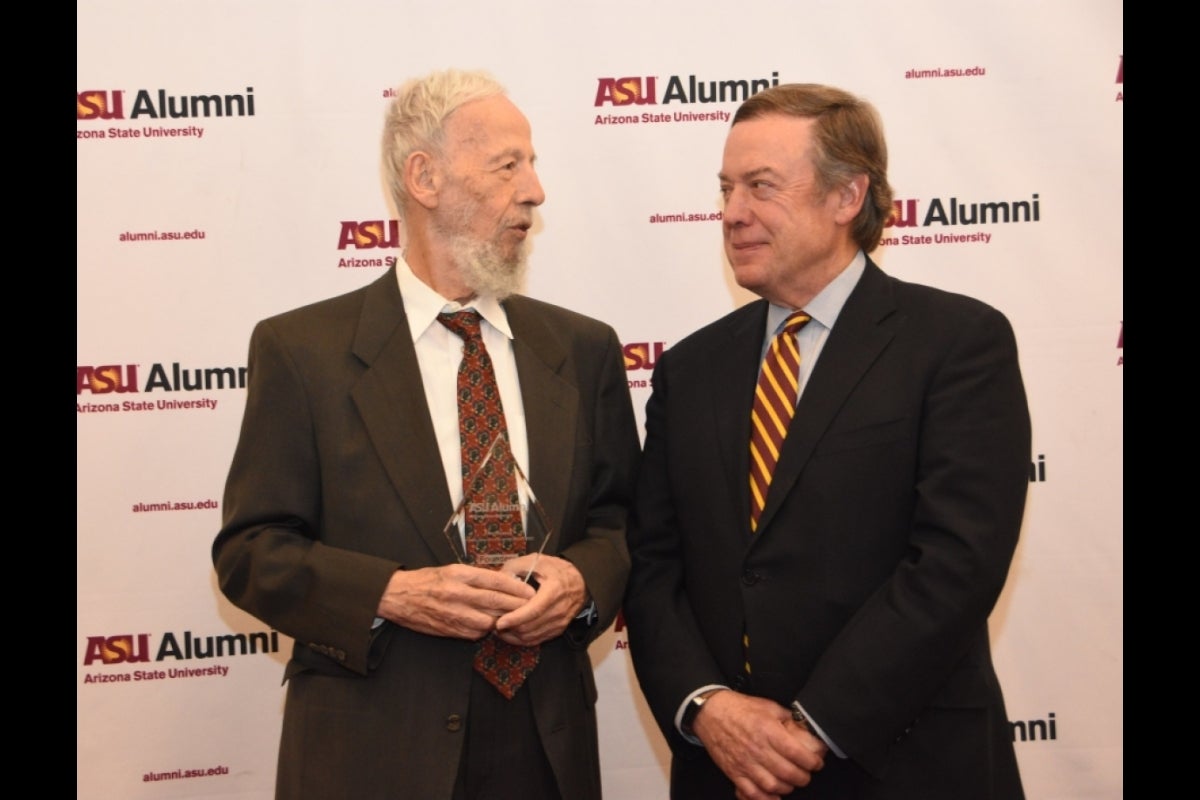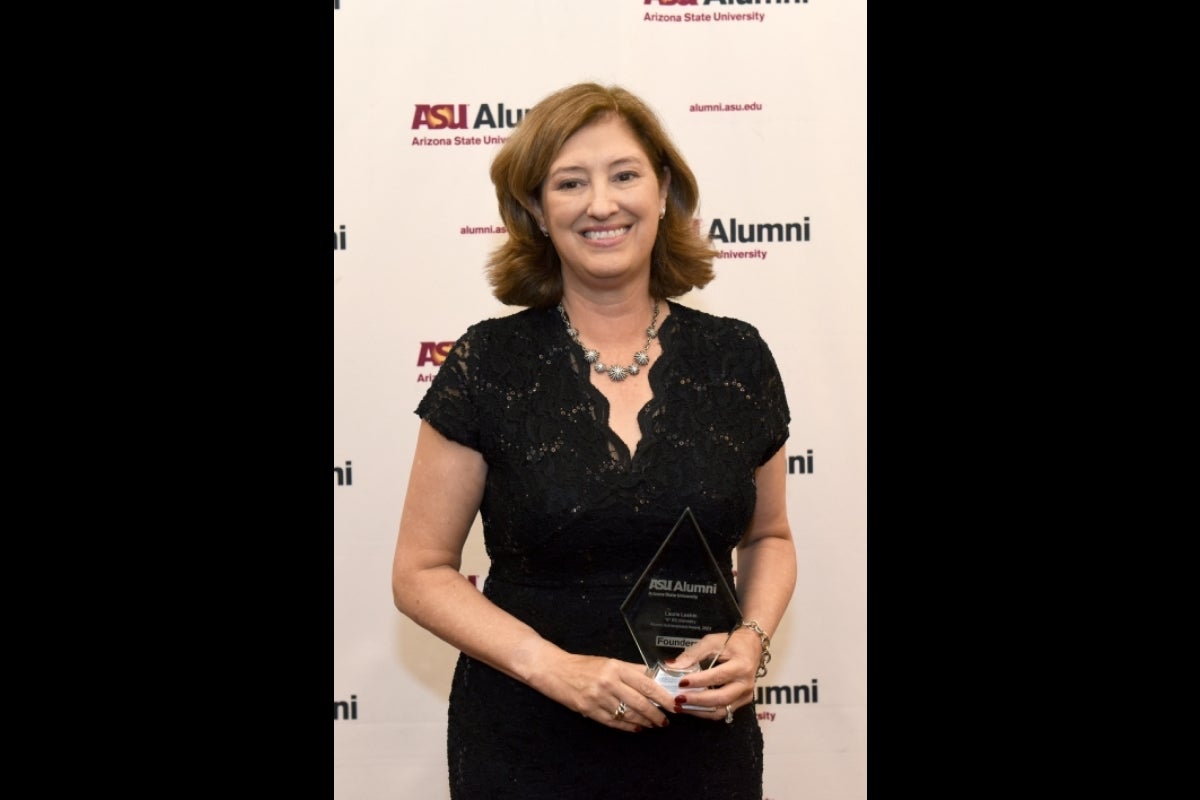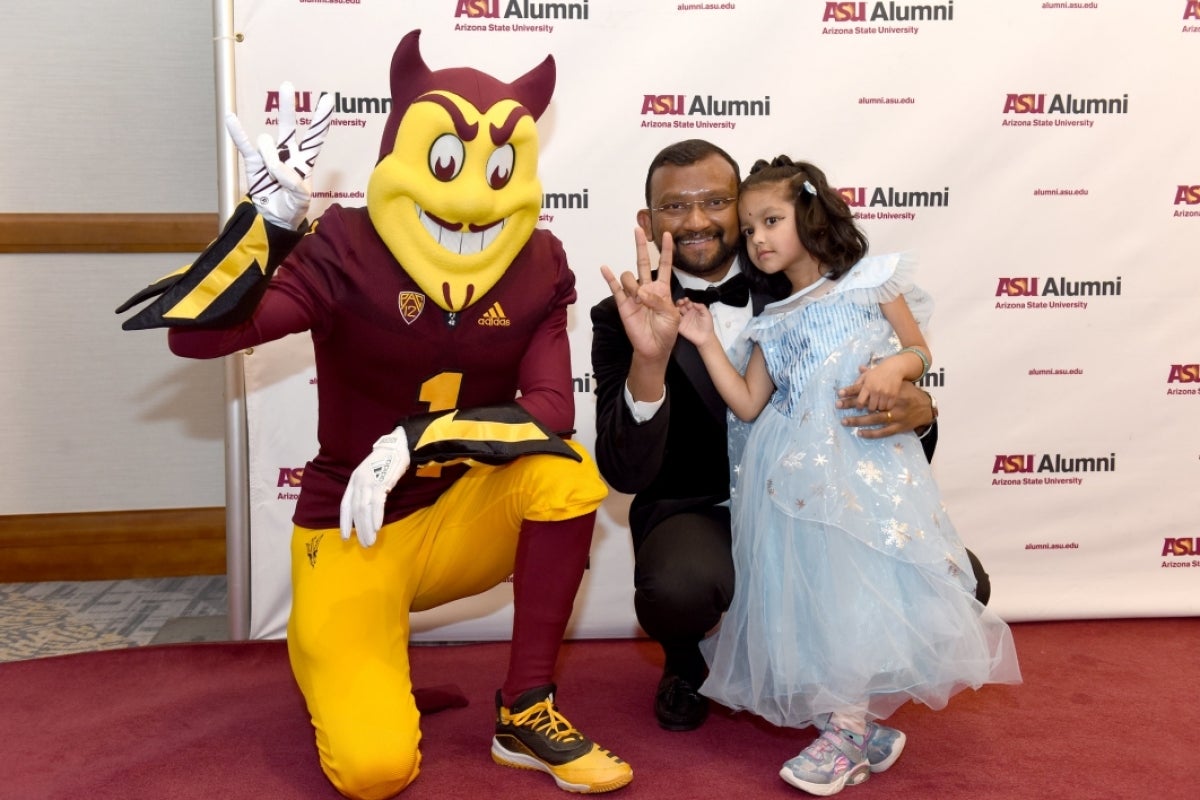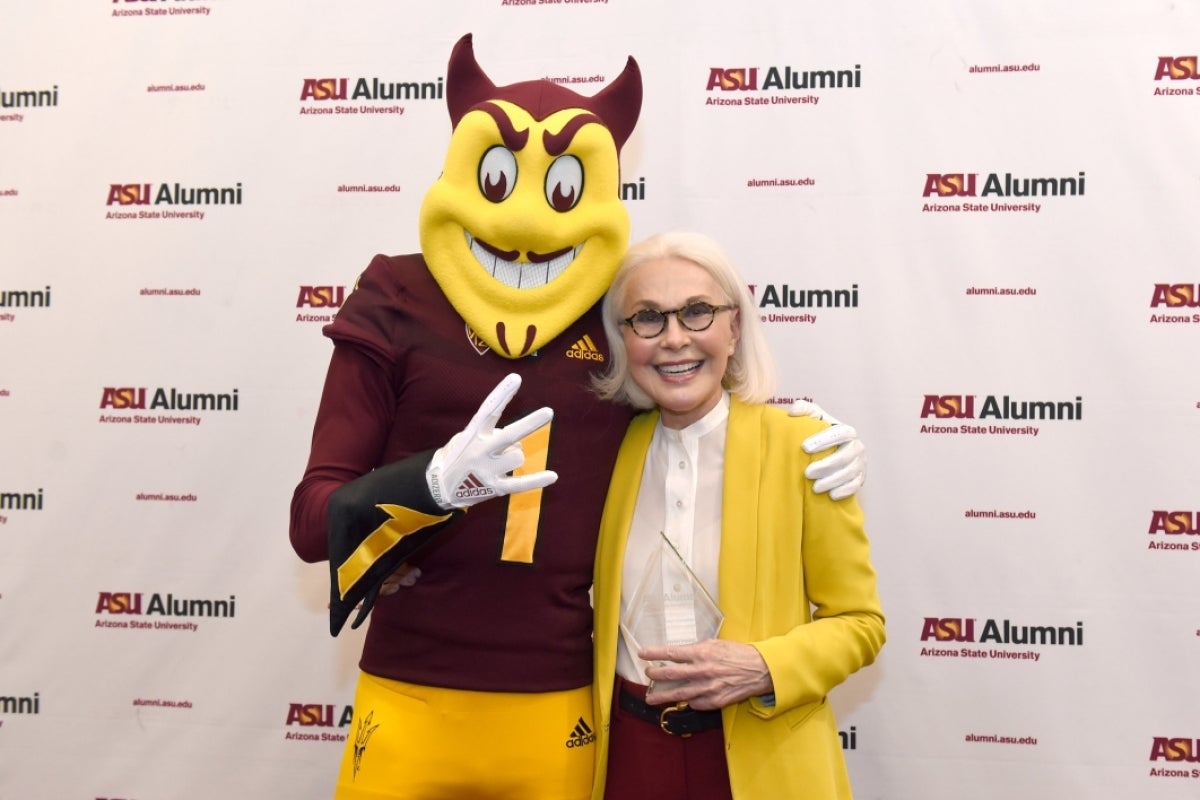Founders’ Day 2023: Honoring the past, celebrating the present, inventing the future

ASU Founders' Day 2023 award recipients (from left): Vivek Kopparthi, Sara Brownell, Laurie Leshin, Peter Buseck, Karen Mossberger, Carolyn Compton and Bennett and Jacquie Dorrance of The Dorrance Family Foundation. Photo by Tim Trumble
In front of a record-breaking crowd of nearly 980 community leaders, business executives and Arizona State University alumni on March 2, the 2023 Founders’ Day Awards program honored ASU alumni, faculty members and benefactors for their distinguished achievements.
Founders’ Day, hosted by the ASU Alumni Association, is ASU’s signature event honoring the changemakers whose pioneering achievements and visionary philanthropy have shaped ASU’s tradition of excellence and innovation.
The annual awards ceremony commemorates the first day of classroom instruction at the original Territorial Normal School on Feb. 8, 1886, and recognizes the university’s growth into one of the nation’s fastest-growing knowledge enterprises.
“ASU is an absolutely unique institution, founded as a territorial teachers college in 1885 and always breaking ground for new ways of doing things while still staying true to its roots,” said ASU’s 16th president, Michael M. Crow. “We have now emerged as the new university prototype, a huge transformation that is really a product of Arizona.”
The event celebrates the innovations and contributions of alumni, faculty members and supporters who reflect the vision, tenacity and hard work of its founders, leaders, faculty, students and alumni through the years. Founders’ Day is a celebration of this founding spirit.
“The spirit of this recognition program advances the New American University, a public enterprise that champions research for the betterment of humanity, educates future leaders impacting the world and accepts fundamental responsibility for the communities it serves,” Christine K. Wilkinson, president and CEO of the ASU Alumni Association, said.
Video courtesy the ASU Alumni Association
The 2023 awards program honored:
Laurie Leshin, Alumni Achievement Award
Leshin, an alum and former ASU faculty member, is an internationally recognized geochemist and scientist who today leads space missions as the first female director of NASA’s Jet Propulsion Laboratory. She was also the first female president of Worcester Polytechnic Institute, has received two White House appointments and has had asteroid 4922 named for her.
“ASU has had a greater influence on my life than it has probably had on most people,” Leshin said. “I have been coming to campus since I was 9 years old, going to classes with my mom, who was a student. I started working on campus when I was 16. I was a student here, and I really learned to be a scientist here. And then I got the thrill of being able to come back as a faculty member, where I really learned to be a leader. And so all of these experiences together kind of have led me to where I am today and I’m so grateful.”
Read Leshin’s full bio and view her video here.
Vivek Kopparthi, Young Alumni Achievement Award
Kopparthi, co-founder and executive chairman of NeoLight — which launched a phototherapy treatment tool that has helped tens of thousands of infants around the world to survive neonatal jaundice — is an alumnus whose product for saving infants’ lives grew from a dorm-room idea. That idea has continued to flourish and expand to solve other medical problems affecting infants.
“My daughter was born three weeks and five days premature. She stayed in the NICU for about two months,” Kopparthi said. “And two years before that, I started building a company that was building cutting-edge technologies for the NICU. … It was pretty clear to me that it was not just jaundice we wanted to solve. We wanted to extrapolate our passion and our hunger and go solve for other conditions in the NICU space.”
Read Kopparthi’s full bio and view his video here.
Peter Buseck, Faculty Service Achievement Award
Buseck, who has spent 60 years on the ASU faculty and has published prolifically, is a pioneer in the use of transmission electron microscopy to study minerals, meteorites and aerosol particles at close to the atomic scale, and is a world-renowned researcher in solid-state geochemistry and mineralogy, cosmochemistry and atmospheric geochemistry.
ASU’s Buseck Center for Meteorite Studies was named for him, as was the meteorite mineral “buseckite.”
“In the late '60s, early '70s, there was a minor revolution in electron microscopy, and all of a sudden it became possible to see things that were never seen before,” Buseck said.
Buseck and colleagues in chemistry and physics became very interested in this technology.
“ASU, all of a sudden, became a major pioneer in electron microscopy, and it was the interaction between these disciplines that made it such a fertile area.”
Read Buseck’s full bio and view his video here.
Dr. Carolyn Compton, Faculty Service Achievement Award
A professor at ASU and the Mayo Clinic School of Medicine and a top female scientist and pathologist in the world, Compton spearheaded the conversion of the ASU Biodesign Institute to a COVID-19 testing lab that utilized the first saliva-based test in the western U.S. and administered more than 1 million COVID-19 tests.
“I did something unprecedented of which I am very proud. And it could be done, I believe, only in a place like ASU, and maybe only in ASU,” Compton said at the event. “ASU has the most spectacular group of professionals who are not only smart but motivated and willing to go the whole distance to do whatever it takes to meet the challenge.”
Widely known for her expertise on cancer research and education, Compton recently recovered from her own cancer diagnosis.
“For the first time in my life, I understood at a gut level what it meant to be a cancer patient,’’ Compton said. “It has motivated me further.“
Read Compton’s full bio and view her video here.
Karen Mossberger, Faculty Research Achievement Award
Mossberger, the Frank and June Sackton Professor in the School of Public Affairs in the Watts College of Public Service and Community Solutions at ASU, is a distinguished researcher of digital equality in communities and its impact on participation and prosperity.
“I conduct research on information technology and its uses and impacts. It’s really about the access to information and the ability to participate in society today,” Mossberger said. “Digital equity is about everyone having the ability to participate in society online.”
As director of the Center on Technology, Data and Society, Mossberger studies how to leverage the data made possible by technological advances.
She is also the author of seven books, including her most recent work (with Caroline Tolbert and Scott LaCombe), “Choosing the Future: Technology and Opportunity in Communities,” which won the Goldsmith Book Prize from the Shorenstein Center at Harvard University.
Read Mossberger’s full bio and view her video here.
Sara Brownell, Faculty Teaching Achievement Award
Brownell is an internationally recognized neuroscientist-turned-full-time professor and education researcher who studies how to make undergraduate biology learning environments more inclusive, including to LGBTQ students and those with anxiety and/or depression. She’s a dynamic, avid educator and national leader who questions what we think we know about undergraduate science education.
“I spend most of my time trying to change who gets to grow up and become a scientist,” Brownell said. “We need a more diverse perspective and people with different identities doing this.”
At the very highest level, the ASU Charter — which states that ASU is measured not by whom it excludes, but by whom it includes and how they succeed — backs up Brownell’s teaching philosophy.
“I can say with absolute certainty that ASU is the absolute best place for me and my career,” Brownell said.
Read Brownell’s full video and view her video here.
The Dorrance Family Foundation, Philanthropist of the Year Award
For more than 30 years, The Dorrance Family Foundation has dedicated its resources to improving communities and the environment through education and natural resource conservation. Among their many projects, The Dorrance Family Foundation supports ASU’s Reef Restoration, Resilience and Recovery program. Led by Greg Asner, director of ASU’s Center for Global Discovery and Conservation Science, the program is creating ecological and cultural solutions to Hawaii’s coral reefs with a hope that these solutions can be translated to help preserve coral reefs — and the health of the oceans — around the world.
“We started going to Hawaii when our son graduated from high school,” Jacquie Dorrance, co-founder of The Dorrance Family Foundation, said in an ASU video.
“Through our son, we became involved in a lot of conservation programs in Hawaii, as well as scholarships, and it has now evolved into some very serious and very exciting ocean work with the steering of ASU.”
This three-generation foundation is led by its founders, Jacquie and Bennett Dorrance, their children, Bennett Dorrance Jr. and Ashley Kaplan, and a recently established G3 Youth Board.
Read more about the foundation and view a video here.
Join ASU Wednesday, Feb. 21, 2024, to celebrate the 50th Founders’ Day at the new Omni Tempe Hotel at ASU. For information on nominating an alum or faculty member, click here.
To nominate an outstanding alum or faculty member for potential recognition at an ASU Founders’ Day celebration, please visit this page to learn more.
More Science and technology

ASU-led space telescope is ready to fly
The Star Planet Activity Research CubeSat, or SPARCS, a small space telescope that will monitor the flares and sunspot activity…

ASU at the heart of the state's revitalized microelectronics industry
A stronger local economy, more reliable technology, and a future where our computers and devices do the impossible: that’s the…

Breakthrough copper alloy achieves unprecedented high-temperature performance
A team of researchers from Arizona State University, the U.S. Army Research Laboratory, Lehigh University and Louisiana State…


